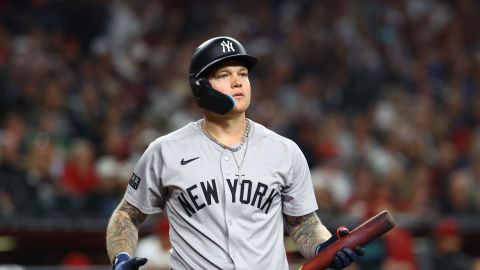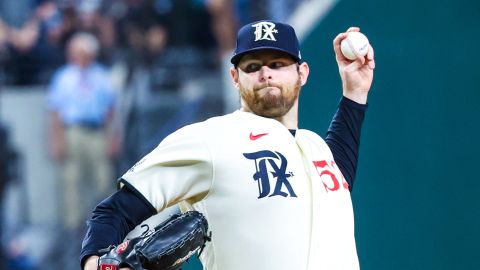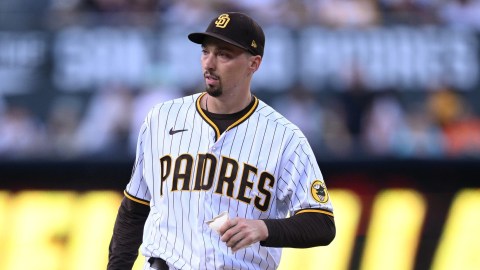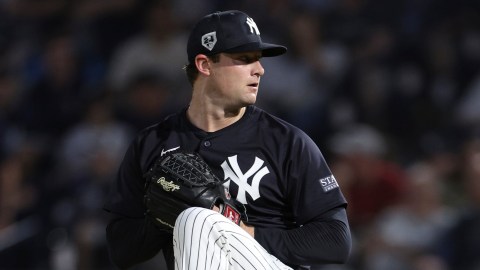 The definition of insanity is doing the same thing over and over again and expecting different results.
The definition of insanity is doing the same thing over and over again and expecting different results.
Actually, that’s completely false.
The medical definition of insanity indicates a person whose mental illness is so severe that they are no longer legally responsible for their own actions. The above statement can be attributed to feminist author Rita Mae Brown (often misattributed to Albert Einstein), who was very much not a psychologist. Nonetheless, it’s a popular quote for the kind of people who live their lives through platitudes on Facebook.
In any case, it’s still true that we’re supposed to learn from our mistakes, but with the Yankees reportedly preparing to offer second baseman Robinson Cano a “significant” extension, New York seems poised to repeat theirs.
It remains to be seen how much the Yankees will end up offering Cano. Although discussing a contract extension, at all, is a stark departure from past business practices for New York, there are other ways, yet, that talks could stall for reasons besides money. For one, Cano’s agent, the infamous Scott Boras, usually prefers that his clients hit the open market.
But, if any of the media-imaged figures turn out to have a grain of truth, it would be in the Yankees’ best interests, too, to let Cano test the waters of free agency.
Look, Cano is a great ballplayer, and not just an elite second baseman, but far and away the best there is and baseball. But that being said, it’s absurd to suggest that Cano will return a good value on a contract akin to Joey Votto‘s 10-year, $225 million deal.
For one, Cano is 30 years old and entering his decline phase. Moreover, giving a deal to a player with Cano’s skill set is less likely to pan out than some of the monster deals handed out to players like Prince Fielder, Albert Pujols or, yes, Alex Rodriguez. All those players had good “old player skills” (a Bill James concept you can read about by following this link) which will erode less with age.
Cano, by contrast, relies on skills which will undoubtedly begin to fall off — and likely soon. Being that he’s a middle infielder, much of his value comes from his defense at second base. However, his defense is rated by most evaluators as well above average, but not elite (Gold Gloves notwithstanding), so it’s highly questionable whether he’ll be viable there in 10 years.
Moreover, much of Cano’s offensive value comes from his ability to hit for a high average, rather than pure power. Bigger power hitters tend to retain more of their value later in their careers because they can still hit the ball out of the park when they make contact, even if they’re not on the ball as often.
Another point of concern is Cano’s history as a relative free-swinger. Although he took a major stride in 2012, walking 61 times, that’s a figure that’s up from 38 in 2012 and no more than 39 in five of his first six season. Plate discipline is as good an indicator we have that a hitter will age well, and that’s why players like Pujols, Votto and Fielder, for instance, are generally safer bets in terms of long-term deals.
Of course, all these points belie the question of whether or not any player is worth a nine or 10-year deal.
In any case, giving an enormous, lengthy contract and placing much of the fate of your franchise on a single player on the wrong side of 30 is a mistake the Yankees already made once (actually, more than once, but that’s a different story). In fact, the Yankees bidding against themselves, too, is a mistake the team looks poised to repeat.
When New York handed out a 10-year, $275 million contract to Rodriguez (over the head of general manager Brian Cashman) the team was absolutely bidding against itself. No team was going to come anywhere near those numbers for a 32-year-old Rodriguez. And though enormous contracts have suddenly become en vogue again (thanks largely to the two Los Angeles teams), it’s questionable, at best, whether another team would ever offer anywhere near 10 years to Cano.
While it’s understandable that the Yankees want to lock up a player they consider an icon — and avoid what-if scenarios altogether — it only begs the question of why they decided to play hardball in negotiations with Derek Jeter, for instance.
Offering Cano an enormous contract extension only repeats the mistake the team made with Rodriguez. Given Cano’s history with the Yankees and New York’s yearly playoff appearances, why wouldn’t the Yankees have the inside track in bidding if Cano hit the open market?
The Yankees’ questionable decision-making is twofold: Why are they bidding against themselves for a player who probably isn’t even worth the kind of huge deal being proposed?
Cano’s probably not a franchise player going forward, and he’s certainly not worth 10 years. If the Yankees are serious about staying under Major League Baseball’s revenue-sharing cap and running the organization like a business rather than imagining their payroll is limitless, Cano is a player who may be worth passing on.



